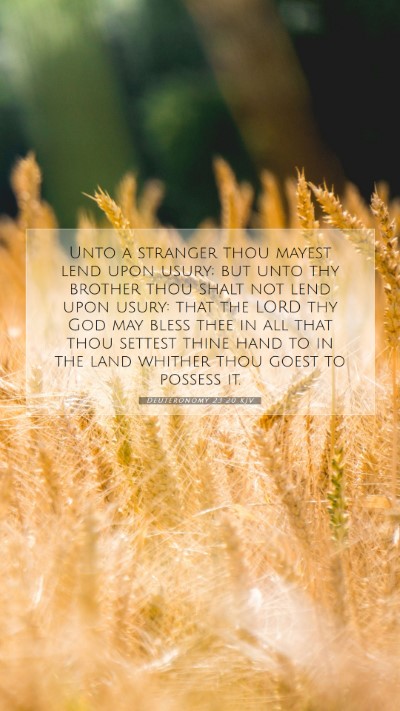Bible Verse Explanation of Deuteronomy 23:20
Verse: "Thou shalt not lend upon usury to thy brother; usury of money, usury of victuals, usury of any thing that is lent upon usury." (Deuteronomy 23:20, KJV)
Understanding Scripture comes from examining the cultural and historical context surrounding the text. This verse from Deuteronomy provides essential insights into the principles of lending in ancient Israelite society.
Key Themes and Interpretations
- Prohibition of Usury: The verse explicitly prohibits charging interest (usury) on loans made to fellow Israelites.
- Concept of Brotherhood: This command emphasizes the idea of community and solidarity among the people of Israel, reflecting their status as a chosen nation.
- Moral and Social Responsibility: By forbidding usury, the text highlights the moral obligation to support one another, particularly the less fortunate.
Commentary Insights
Matthew Henry's Commentary
Matthew Henry explains that the essence of this command is rooted in godly compassion. He notes that lending to a brother without expecting interest promotes community support and reflects God’s merciful nature. Henry emphasizes that the prohibition of usury serves to protect the poor, preventing them from falling into deeper financial distress.
Albert Barnes' Commentary
Barnes clarifies that the term "brother" symbolizes any fellow Israelite, thus extending the moral obligation to all within the community. He interprets this verse as a guideline for fair economic practices, suggesting that interest on loans could exploit vulnerability, which is contrary to the spirit of brotherly love.
Adam Clarke's Commentary
Clarke provides historical context by explaining that in ancient times, economic practices included bartering goods and services. He notes that asking for interest could lead to cycles of debt that adversely affect families. Clarke stresses that this commandment was meant to uphold justice and promote a thriving community life.
Application of the Verse
Though the text originates from an ancient context, the underlying principles remain relevant today.
- Modern Lending Practices: This verse encourages individuals and institutions to consider ethical implications in lending and financing practices.
- Community Support: Believers are called to foster environments that uplift those in need rather than exploit them financially.
- Biblical Justice: The principles of fairness and generosity found in this verse can guide individuals in their interactions and business dealings.
Cross References
- Exodus 22:25: Further instructions about lending to the poor without interest.
- Leviticus 25:36-37: More information on how to deal justly with a brother in need.
- Psalms 15:5: Describes the character of those who are righteous in their dealings.
Conclusion
In studying Deuteronomy 23:20, one can gain profound Bible study insights, leading to a richer understanding of Bible verse meanings in the context of community ethics and moral responsibility. Engaging with this scripture through various commentaries enables deeper Biblical exegesis and offers practical applications for modern believers in their daily lives.


